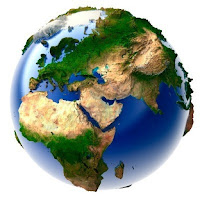Geography Vocabulary
 Coast: the land next to the sea.
Coast: the land next to the sea.Ocean: the vast body of salt water.
Valley: a long, narrow area that is lower than surrounding uplands, hills, or mountains.
Hill: a natural elevation of the earth's surface, smaller than a mountain.
River: a natural stream of water flowing in a definite course.
Water evaporates: water vapor
Mountain range: change of mountains.
Lake: a body of fresh or salt water of considerable size, surrounded by land.
Oasis: an area in a desert region where plants and trees can grow, usually having a spring or well.
Desert: a hot, dry, sandy region with little or no rain or water:
Archipielago: Group of islands.
Islan: an area of land completely surrounded by water but not large enough to be called a continent.
Continent: one of the seven main masses of land on the earth: Europe, Asia, Africa, North America, South America, Australia, and Antarctica.
Flood: a great flowing or overflowing of water, esp. over land not usually submerged.
To food: to cover with or as if with a flood.
Earthquake: vibrations in the earth's crust causing the ground to shake.
Volcano: a vent in the earth's crust through which lava, steam, ashes, etc., are given off, either continuously or at intervals.
Population: the total number of persons, animals, or other living things living in a country, city, etc.
Agriculture: the science, art, or work concerned with cultivating land, raising crops, and feeding and raising livestock.
Industry: the group of manufacturing businesses in a particular field.
Natural resources: native appeal

Very good. It is quite complete
ReplyDelete